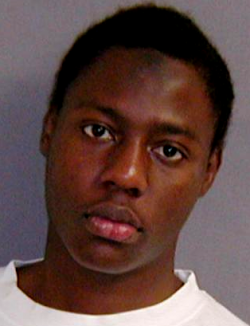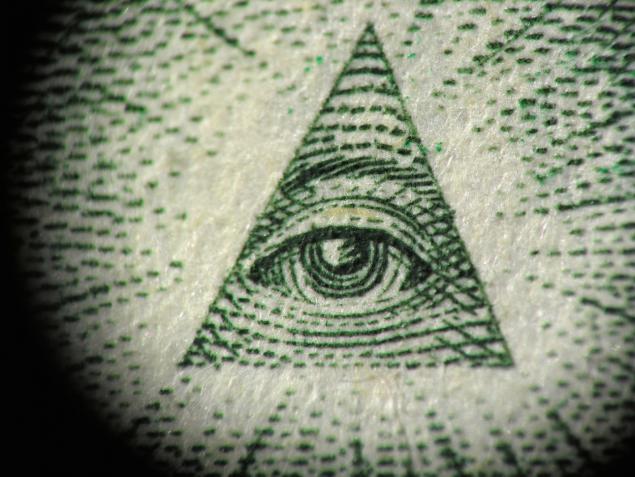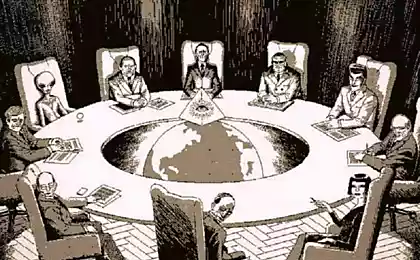957
Why do some people believe in conspiracy theories?
Intelligent dobrodeteliPochemu vices and some people believe in conspiracy theories? It's not just who they are or what they know. It's a question of maturity of intellect.
Not everyone believes that the tragedy of 9/11 - terrorist aktZnakomtes - Oliver. Like many of his friends, Oliver considers himself an expert on the events of 11 September. He spends most of his free time on conspiracy sites and in the course of his research convinced that the terrorist attacks of 11 September 2001 in New York and Washington, DC - the work of special services. He argues that the ram aircraft and, as a result, fires can not cause the collapse of the twin towers of the World Trade Center. The only explanation for the disaster Oliver considers the actions of government agents, there are pre-set explosive devices. He understands, of course, that the government blames al-Qaida in the events of 9/11, but the government can say anything, do not you?
People tend to some dubious their beliefs reinforced by other, at least questionable h4> Survey data indicate that the views of Oliver to the events of 9/11 are not something unusual: he was not the only one who thinks that there was a conspiracy.
Not everyone believes that the tragedy of 9/11 - terrorist aktZnakomtes - Oliver. Like many of his friends, Oliver considers himself an expert on the events of 11 September. He spends most of his free time on conspiracy sites and in the course of his research convinced that the terrorist attacks of 11 September 2001 in New York and Washington, DC - the work of special services. He argues that the ram aircraft and, as a result, fires can not cause the collapse of the twin towers of the World Trade Center. The only explanation for the disaster Oliver considers the actions of government agents, there are pre-set explosive devices. He understands, of course, that the government blames al-Qaida in the events of 9/11, but the government can say anything, do not you?
People tend to some dubious their beliefs reinforced by other, at least questionable h4> Survey data indicate that the views of Oliver to the events of 9/11 are not something unusual: he was not the only one who thinks that there was a conspiracy.
Indeed, there are a lot of conspiracy theories, such as the spread of AIDS, landing on the moon in 1969, about UFOs and the Kennedy assassination ... sometimes conspiracy theories turn out to be true - really was the Watergate conspiracy. But mostly it's rubbish.
People tend to some questionable beliefs underpin their other equally questionable
In fact, conspiracy theories are a vivid illustration of the astonishing truth about man: even though we are smart and educated, many of us still believe in strange things. You can meet people who feel that they were abducted by aliens, that the Holocaust never happened and that cancer can be cured by positive thinking. In 2009, the Institute of Public Opinion Research Pall Harris found that one-fifth to one-quarter of Americans believe in reincarnation, astrology and the existence of witches. Why people believe weird things?
Of course, you realize that the theory of Oliver 9/11 realistic enough, and you might be interested: why is it having access to the compelling evidence to the contrary, believes that the events of 9/11 were the work of the security services?
I am convinced that Oliver thinks so because with this case, in his opinion, there is something wrong. He is not crazy, yet his conception of 9/11 are the result of the functioning of his intellect.
The problem is that not everything has a rational explanation. If you ask Oliver's why he does not consider the events of 9/11 terrorist attack by al-Qaeda, it will of course be only too happy to explain to you his reasons: it is the work of the security services, he insists, because only one aircraft collisions with towers they can not fall. It is not right, but it's his theory, and he holds it. In fact, he explains the existence of one of his questionable beliefs of others, at least questionable.

Psyche plot: credulity and uncritical myshleniyaTeper let's concretize the story of Oliver: it appears that in addition to the events of 9/11, he considers true and many other conspiracy theories. He thinks that the moon landing was a falsification, that Diana was murdered by MI6 and that the Ebola virus - is to escape from the control of biological weapons. Those who know him well say that it is easy to cheat, and that he is careless in their thinking, and a poor understanding of the difference between the authentic evidence and unwarranted speculation.
Oliver believes that 9/11 was the work of the security services, because he is trusting. He suffers from what social psychologists call "conspiracy mentality».
At the same time, Oliver, as you might expect, the last one to admit that his opinion about the events of 9/11 is such precisely because he is trusting. Trusting rarely feel that they are trusting, and conservatives do not think they are conservative.
Vicious intellektEdinstvennaya hope to overcome their ignorance in such cases - is to accept the thesis that other people: your employees, spouse, friends - probably know the features of your your intelligence is better than you. But even this will not necessarily help. In the end, you can simply refuse to listen to what you say about other people and how they evaluate your intelligence. Some defects are incurable.
Credulity, negligence and conservatism are examples of what the philosopher from the United States Linda Zagzebski in his book "The virtues of the mind" (1996) called "intellectual disabilities". Add to this the more negligence, omission, rigidity, stupidity, prejudice, lack of accuracy and insensitivity to detail.
Intellectual habits and style myshleniya
To describe Oliver as the gullible or unwary need to have an idea about the way his thinking - for example, as it continues to try to find information about the events of 9/11. Humility, caution and care - those of the intellectual virtues, which Oliver is clearly not enough, which is why his attempts to get to the truth about the tragedy of September 11 are wrong.
Oliver is a fictional character, but real examples of intellectual defects in real life it is easy to find. Consider the case of Umar Farouk Abdulmutallab bomber, who tried in 2009 to blow up the plane, en route flight from Amsterdam to Detroit.
Abdulmutallab was born in Lagos, Nigeria, to a wealthy and educated family, he graduated from University College London with a degree in "Engineering". He was radicalized online sermons Islamic militant Anwar al-Awlaki. This fact alone eloquently characterizes his intellectual nature. If an intellectual hero Abdulmutallab was not deceived by al-Awlaki, it may not have been on a transatlantic liner with explosives in his underwear.
"Hot hand": a misconception about random posledovatelnostyahUtverzhdenie that people have questionable convictions because they are stupid or gullible, untrue. Social psychologist Thomas Gilovich US argues that many of these beliefs are "purely cognitive origins," that is caused by the imperfection of our ability to provide adequate information processing.
His example of cognitive explanation - the "hot hand" in basketball. The idea is that when a player throws a few balls, he probably can throw and follow - success breeds success.
Gilovich uses a detailed statistical analysis to show that the phenomenon of the "hot hand" does not exist: the number of casts in a given period of time does not depend on the player's performance in the previous period.
Q: Why are so many basketball coaches, players and fans somehow believe in "hot hand"? Gilovich explains that the phenomenon is based on our misconception about random sequences.
It is significant that happened when Gilovich sent the results to many basketball coaches. One of them replied, "Who is this guy? How is he doing research? I do not believe him. " This is an excellent illustration of the intellectual defects in action.
Scornful reaction reveals a number of intellectual vices, including a closed mindset and prejudices. The conclusion suggests itself that the coach has reacted this way because it was closed or configured biased. In cases such as this, or as in the case with Oliver, the information was not credible simply because accept explanations prevent defects intellect. Less hidebound coach may react quite differently to the evidence that the "hot hand" does not exist.
Situational factors often replace us harakterMozhem we explain the behavior of the coach, without referring to his personality as a whole? Some psychologists say that our behavior, as a rule, it is best explained by situational factors than our hypothetical traits. Some see this as a good reason to doubt the existence of a general nature.
In one experiment, students of the seminary were invited to give a talk on campus. One group was asked to tell the parable of the Good Samaritan, others have suggested other topics. One said that they have enough time to get to the venue of the lecture, and others - that they need to hurry.
On the way to the venue of the lecture all the students were met with a man (actor) in need of help. Students who think that late, stopped to help less frequently than students who were convinced that will have time to top the lecture.
Princeton philosopher Gilbert Harman believes that the main aim of such experiments is "to convince people that they looked at the situational factors and stopped trying to explain a lot of things in terms of features of character».
Some supporters Harman also oppose the idea of the intellectual virtues and vices. For example, they point to the fact that people work, solve problems and challenges are much better when they are in a good mood.
Smart character explains the intelligent behavior only in conjunction with many other things, including situational factors and taking into account how our brain processes information.

As intelligent character defects determine our ubezhdeniyaS practical point of view, the most difficult to work with people like Oliver, is that they are likely to charge you the same intellectual deficiencies, which you will find in them. You say that Oliver confidently believes his theory about 9/11 conspiracy theory; He says that you are confidently relying on the findings of the 9/11 Commission. You say that he rejects the official version of 9/11 because it is conservative; He accuses you of closed thinking for refusing to accept a conspiracy theory seriously. If we do often forget about our own intellectual vices, then who are we to blame Oliver's failure to understand that he believed a conspiracy theory true just because he is trusting?
Of course, no one is safe from their own ignorance. But this does not justify Oliver. The fact that his theory is no good, while there is every reason to believe that the twin towers collapsed precisely because they were rammed planes. What do you think the same way as it is written in the official report on the events of 9/11, does not make you gullible, if there are reasonable grounds to believe that the report is truthful. Likewise, skepticism to the conspiracy theory does not make you a conservative, if there are good reasons for skepticism. Oliver trusting, because it is based on a theory that has no good reason, and it is conservative because it rejects the theory for which there is evidence. Oliver does not want to agree with such conclusions, and this reflects the defects of his intellectual nature.
Harmful intellectual habits are difficult to korrektirovkeOstaetsya problem of what to do with people like Oliver. If he really is conservative, he did not recognize. Closed thinking is one of the most complex intellectual vices. And even if you somehow can make the world of Oliver admit their shortcomings, it does not necessarily make the world a better place. Fighting their intellectual disabilities requires self-knowledge and motivation.
Can we condemn Oliver for his weakness? Philosophers believe that the virtues have a positive motivation, and the vices of a bad, negative. But Oliver's motives are not necessarily bad. He can have the exact same motivation to knowledge, as well as intellectually virtuous man, but to be in error because of their gullibility. Therefore, the motive and responsibility for their intellectual vices Oliver may not deserve severe censure. This does not mean that in such cases need not do anything. If we care about the truth, you have to take care of the intellectual preparation of people to arrive at the truth.
The best way to do this - the right education. Intelligent vices - a tendency to think only in a certain way, and the trend may be changed. Our intelligent vices balanced our intellectual virtues and character traits such as openness, curiosity and accuracy.
Philosopher Jason Baer says that "the education of the intellectual virtues" - is, in principle, the best way to fix people like Oliver.
What if Oliver had gone too far and can not change his mind, even if I wanted to? Like other addictions, intellectual can take root too deeply. We'll have to live with the consequences.
Attempts to argue with people who are stubborn, conservative, dogmatic and biased, are unlikely to be effective. The only remedy in such cases - to try to mitigate the damage to their vices for themselves and for others.
via aeon.co/magazine/philosophy/intellectual-character-of-conspiracy-theorists/
"Normal": A simple way to become happier
30 days of beetles: the student spent a month on a diet of insects


























